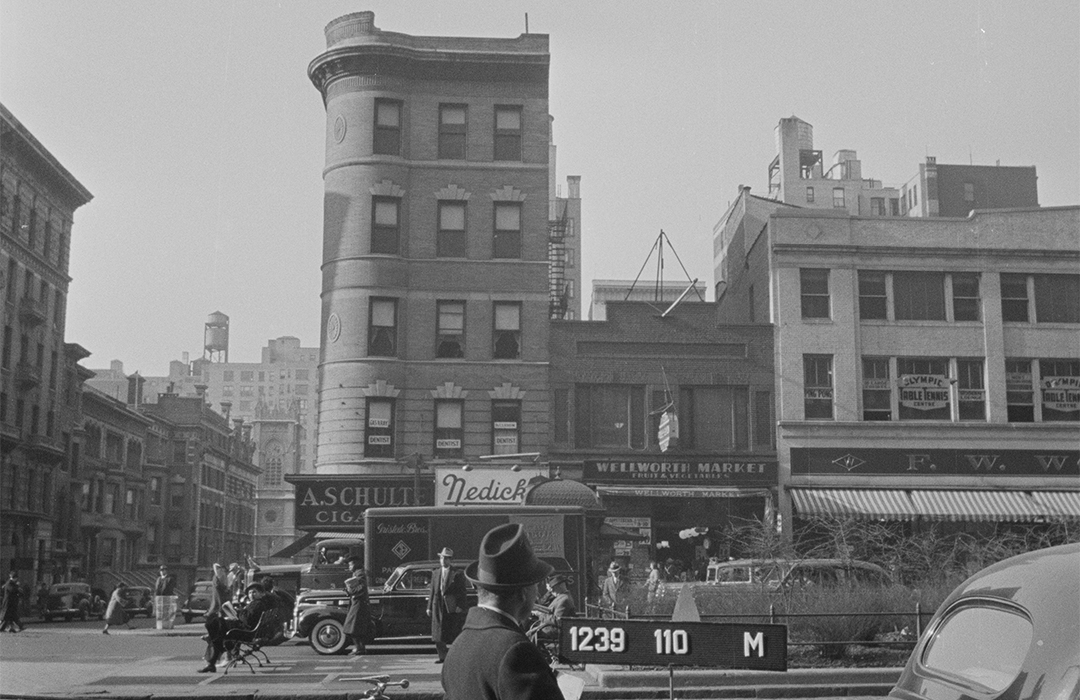
2463 Broadway
by Tom Miller
Just before the turn of the last century, developer Patrick J. Doherty hired architect G. Robinson to design a two-story commercial building on “Western Boulevard, 25 feet north of 91st Street,” as described in the plans. (Within about a year, the address would be 2463 Broadway.) Robinson’s Arts & Crafts style building featured Chicago-style windows on the second floor and a stepped parapet that held a jutting flagpole.
The building became home to K. Salzman’s apparel business. He ran his clothing store from the first floor and did his manufacturing on the second. In the basement was a barber shop. Then, sometime after 1904, Patrick J. Healy renovated the building for a restaurant. It was a surprisingly understated space for the restauranteur, who operated other grand restaurants on the Upper West Side, one of which was on the corner of Columbus Avenue and 66th Street.
When Healy’s restaurant closed in 1914, the space was taken by Albert Menjon for his French restaurant Maison Menjon. Expectedly, he imported his chef, Jean Cassassus, from France. An advertisement in The Evening Telegram on October 5, 1916, touted, “Music—French Table d’Hote—Dancing.” A prix fixe dinner with wine cost 75 cents, or about $20 in 2023 terms. The ad promised, “A trial will convince you there is no better dinner.”
On December 7, 1930, the Syracuse American reported on the raids of two Manhattan speakeasies during which 35 men and one woman were arrested.
Despite the advertisement’s confidence, in 1919, Maison Menjon was supplanted by a Brenton Restaurant. There were two others relatively close—one at Broadway between 81st and 82nd Streets, and another on Broadway between 107th and 108th Streets. This one, run by Margaret Witte, lasted until 1927, when C. & L. Lunch Co., Inc. rented the building. The chain ran several luncheonettes throughout the city and, as had been the case with the Brenton Restaurant, another was relatively close by, on Broadway and 80th Street.
As it turned out, the proprietor of this branch was selling more than ham sandwiches and coffee. On December 7, 1930, the Syracuse American reported on the raids of two Manhattan speakeasies during which 35 men and one woman were arrested. One of the two locations was 2463 Broadway. The article noted, “Liquor was seized in each place.”
Three years later, the luncheonette was gone, and the architectural firm of C. N. & S. Whinston was hired to remodel the building. Charles N. Whinston and his brother Selig had designed or remodeled many Manhattan structures. Their changes resulted in a grocery store at ground level, home to the Wellworth Market, and a restaurant on the second floor.
In 1964, the ground floor was remodeled for the offices of the West Side Democratic Club. The renovation plans noted, “second floor to remain vacant.” The group held programs pertinent to Upper West Side residents here. On January 30, 1964, for instance, it hosted what The New York Times called “a forum of considerable interest to New York sportsmen.” The subject was “a discussion on firearms legislation.” The speakers included State Senator Joseph Zaretski, Judge William E. Ringel, and National Rifle Association director Woodson Scott (whom The New York Times called “an outstanding pistol and rifle shot”).
The subject was “a discussion on firearms legislation.”
The building was remodeled again in 1989 to accommodate an Off Track Betting parlor on the ground floor, a small printing business in the cellar, and offices on the second. It was possibly at this time that the façade was covered in flat panels, the Chicago windows replaced with plate glass, and the parapet removed. Upper West Side gamblers were no doubt disappointed on March 26, 1993, when OTB announced this parlor was one of seven in New York City that “will eliminate Sunday wagering.”
In 2008, the former betting parlor became home to a Le Pain Quotidien branch, while upstairs were the offices of attorneys Weisberg & Weisberg. Le Pain Quotidien was established in Brussels in 1990. The first American location for the bakery-restaurant opened on Madison Avenue in 1997, and by now, the chain was expanding throughout the country.
Le Pain Quotidien was a success in the location and was still operating here in 2017 when Hampshire Properties filed plans to build a 15-story residential building on the site of 2463 Broadway and its next-door neighbor at 2461. Demolition began in 2019.
Tom Miller is a social historian and blogger at daytoninmanhattan.blogspot.com
BUILDING DATABASE
Keep Exploring
Be a part of history!
Think Local First to support the businesses at 2463 Broadway:


